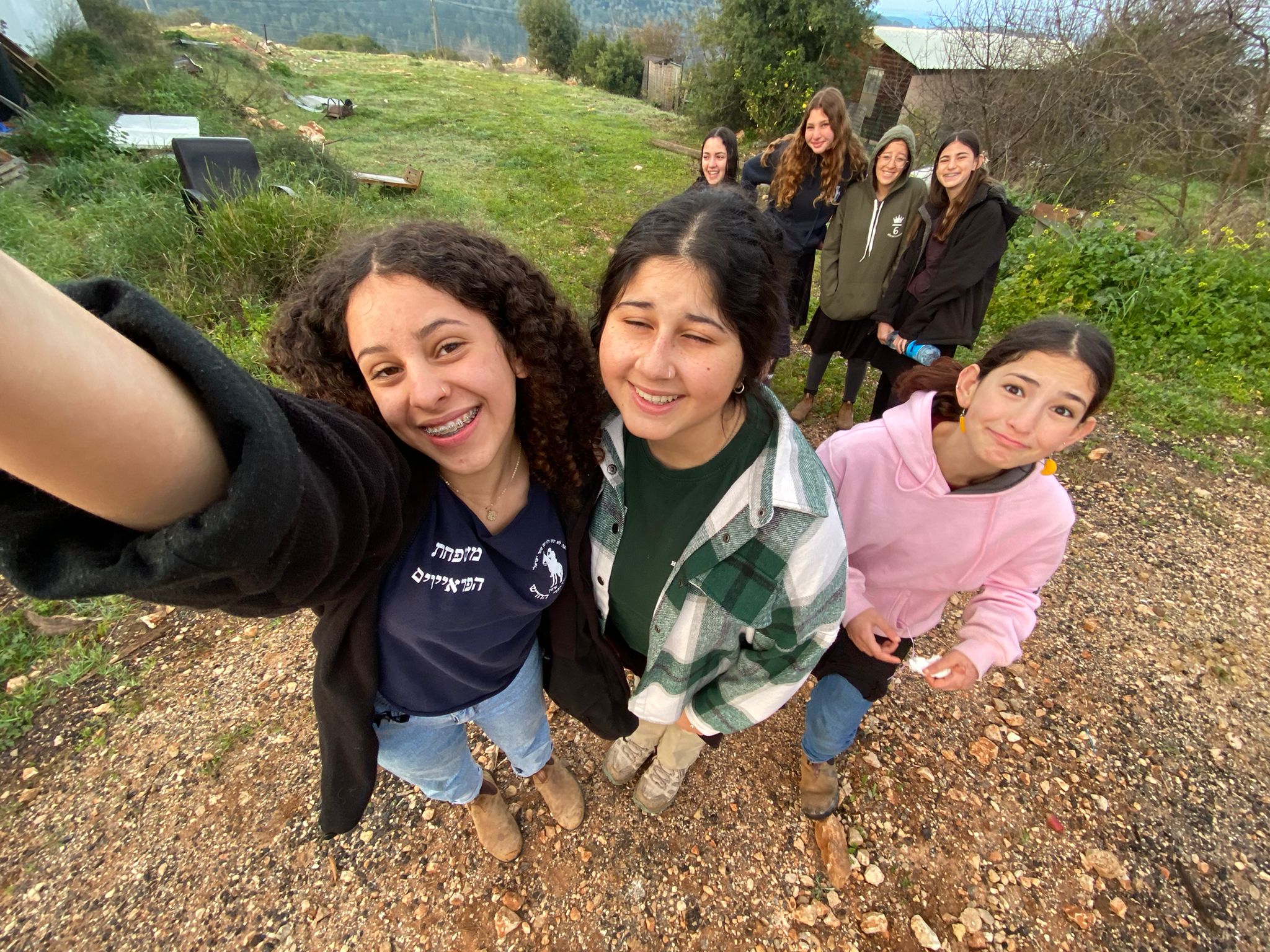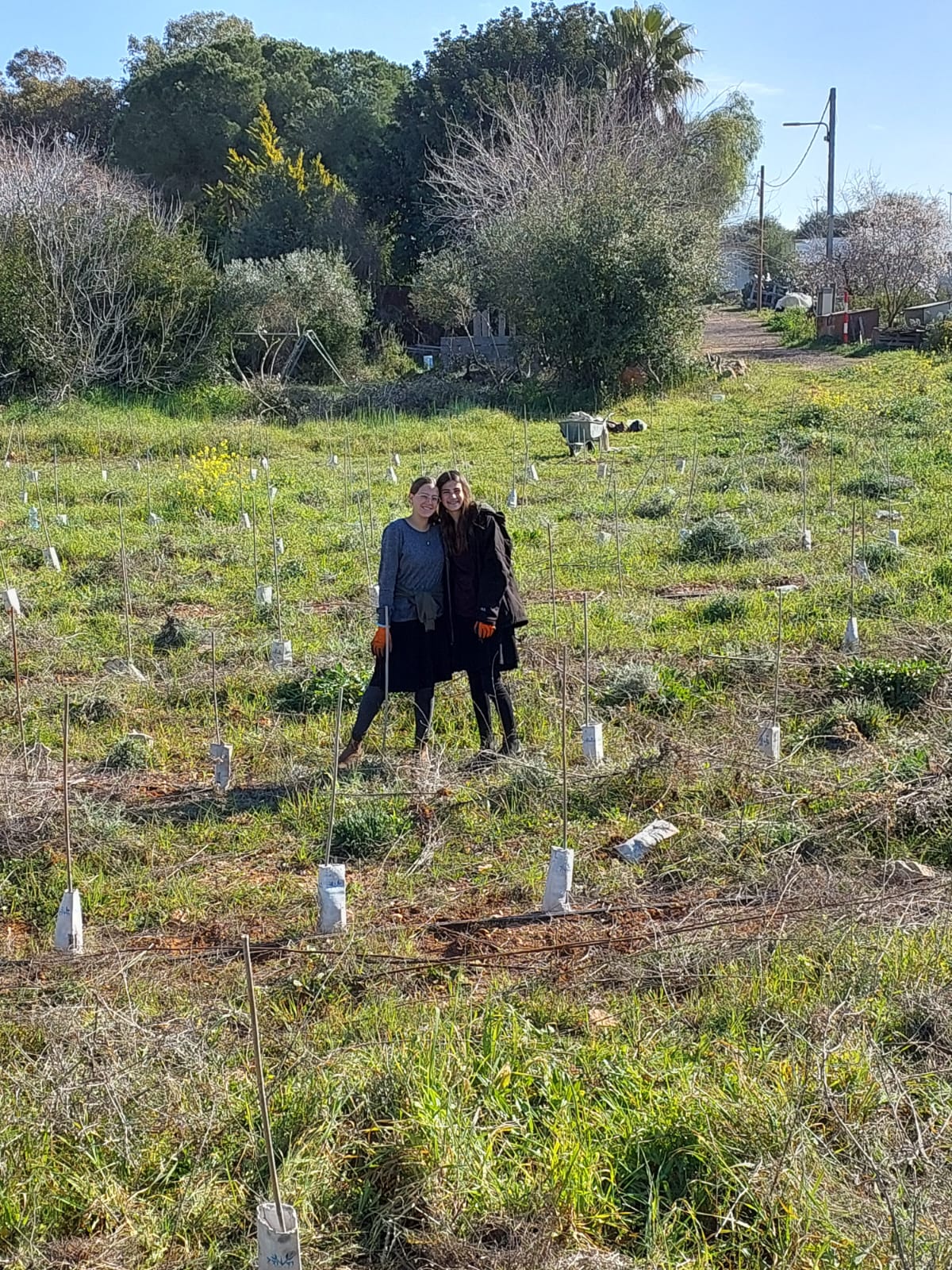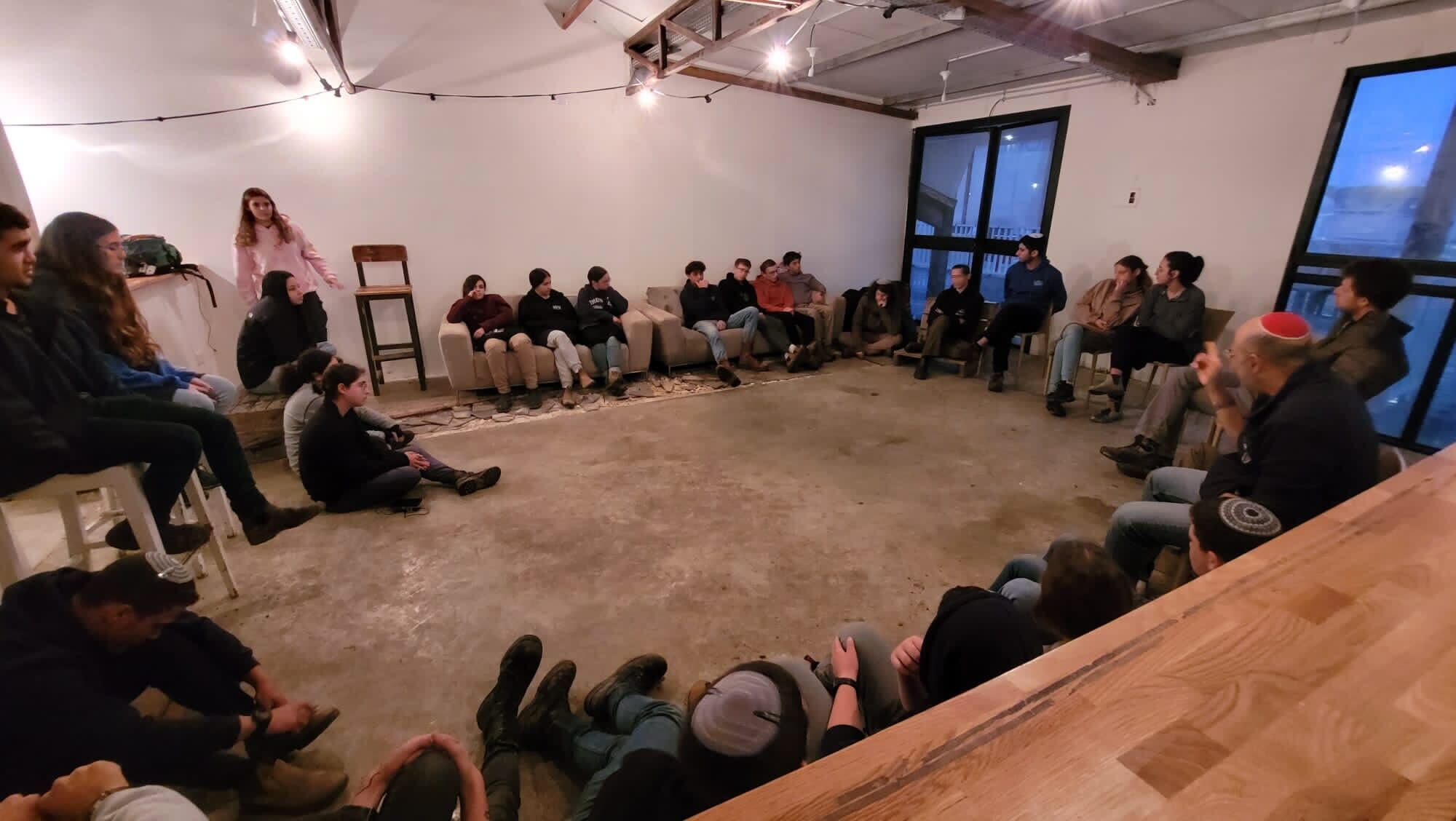Weeks before Palestinian terrorists murdered her, 15-year-old Rina Dee was in a field in Moshav Bar Giora with other young volunteers on behalf of the HaShomer HaChadash movement, pruning vineyards to make room for seedlings.
The HaShomer HaChadash youth group, called The Freyerim (“The Suckers”), is committed to helping independent farmers in Israel pick, prune, build, plant, and secure their farms. Rina was eagerly anticipating participating in the next program, an overnight at Kibbutz Ramat Rachel on April 13 and April 14.
The terrorist shooting that took the lives of Rina, her older sister Maia and their mother, Lucy, in the Jordan Valley on April 7, left Israel in mourning and the Freyerim Efrat/Jerusalem branch devastated. The group will be meeting to study in memory of Rina and recall her dedication and her love for the Land of Israel. And bright and early on Friday, they will be working in the orchards and fields of the kibbutz.
Hodaya Schlissel, a friend of Rina from Efrat, was with her the first time she volunteered.
“As an olah, Rina had a special love for the land,” recalled Schlissel. “There is something very meaningful about helping the farmers that need us. Picking through the vineyard and getting it ready for planting, Rina and I felt we were really needed and that we helped them get the job done in hours instead of days. I am sure she would have kept on volunteering. That was just the way she was.”
According to Yoel Zilberman, founder and CEO of HaShomer HaChadash, although Rina was from a religious family, she did not hesitate to volunteer in the non-religious Moshav Bar Giora. She saw a farmer in need and responded immediately. “She symbolizes the unity of the people of Israel,” he said.
In a much-forwarded social media message, Rina was described by the mother of one of her friends as “an incredible, mature, responsible, thoughtful and above all KIND person” who was also the dependable, super-organized one. “No photo could possibly capture what a beautiful, beautiful, beautiful person Rina was.”

Land, Zionism and unity
Gil Maclin, current director of international relations and former organizer of the Freyerim high school age program for HaShomer HaChadash, says a key part of the organization’s mission is to support the land, promote Zionism and create unity throughout Israel.
“Whenever and wherever there is an urgent need in a field, the volunteers come and save the day,” he explains.
The organization focuses on helping farmers because they hold on to state land, Maclin points out.
“When a farmer suffers, it is important to help because it is our land. We try to be the first responders in the most relevant places. When there are pressing issues and there is an immediate threat to Israel, the organization is there. [When] incendiary balloons [were dispatched by terrorists] from Gaza, we had people in vantage points, pinpointing where the fires were started,” he noted.
“The Freyerim group began after Operation Protective Edge in 2014 to help support farmers in the ‘Gaza envelope,’ ” explains Maclin. “Some kids came to volunteer on a weekly basis and when someone said, ‘All this work and no pay—you are freyerim [“suckers”],’ their response was, ‘I’m proud to be a freyer! Would you charge an old lady for helping her cross the street?’ And somehow the name stuck.”
Teenagers came to run a camp in Ein Camonim in the Galilee back in 2014. They helped to prune a neglected olive grove. Tree by tree, they did a huge amount of work, cutting down weeds to create trails through the grove and trimming the trees so that nets could be set up to catch the olives when the time came to harvest them.
When the COVID-19 shutdowns hit there was a desperate need for volunteers due to shortages of workers, many of whom went back to Thailand or the Philippines or were not allowed entry from Judea and Samaria. According to Maclin, so many volunteers came forward that they divided them into regional teams. There are now 15 teams all over the country except for Eilat.
Working with love
Volunteers join the Freyerim group in ninth and 10th grade and receive on-the-job training in agriculture from the farmer being helped and older volunteers. They may not work as quickly as migrant workers but they speak Hebrew and understand what to do, and they do it with love.
Maclin explains why working with love is important.

“Right now, we are in the peak of the produce picking. Everyone needs workers at once and workers get paid by the number of containers they fill up, so they will pick the low-hanging fruit just to fill up the boxes. Volunteers, on the other hand, may do a slower job but they really care, so will pick the best fruit from the whole tree.”
Currently there are between 800 and 1,200 Freyerim volunteers, not counting the older alumni who come to help out when they came.
HaShomer HaChadash began in 2007 and grew slowly. There is a volunteer program for people from 4th grade through age 99. The 24,000 participants in the 4th through 12th grades are in the Hatnuah HaChadesha program and work mainly in moshavim and kibbutzim.
For those in 11th through 12th grade, HaShomer HaChadash offers the Alexander Zeid leadership program for both religious and secular youngsters. Participants are hand-picked and invited to attend seven seminars during the school year and travel across Israel to operate social projects including cleaning up beaches, connecting with new immigrants and fixing up houses for Holocaust survivors. They are encouraged to look for something that needs to be fixed and to create a program.
After high school options include performing a year of service working on educational farms (known as urban farms). There are 14-17 such farms throughout Israel, and the organization is hoping to create as many as 40 soon. Three of the farms were built in Bedouin villages up north where the majority of the residents no longer work in agriculture.
According to Amichai Bluth, chief operations manager for HaShomer HaChadash, as of last year the organization had had a total of 120,000 volunteers. The vast majority work the land and many protect it.
Taking the night shift
“Volunteers help hundreds of farmers by taking the night shift,” he said. “Farmers will often sleep with their cows and sheep so no one will steal the animals or burn their fields. Spending the night in the fields brings down crime by over 40%.”
The most challenging volunteer option is the Mitzpeh 13-month pre-army preparatory program. It is a commune of 13-15 volunteers who guard a farm two nights a week and carry out agricultural work as well as physical preparation, including krav maga, and courses in Arabic and Zionism. The group learns the terrain of the farm and secures the land without weapons. That might involve finding a vantage point for reconnaissance or simply making their presence known. If they spot criminal activity, they report it.
“It’s hard work,” explains Maclin. “They guard at night and wake up and cook lunch, or volunteer from 5:30 am to 1 pm. It’s great preparation as the army is all about working hard and giving. They are given a budget for food. In this program, they learn how to be adults. And the farmers don’t know what to do without them.”
For volunteers over the age of 21, there are operational units including drone units with night vision that carry out patrols and communicate with police. According to Maclin, cows, sheep and avocados are high on the list of most likely-to-be-stolen items. There are also jeep, motorcycle and static guard units to help protect against and deter thieves. There is a volunteer program that works with the Border Police and is given credentials.
HaShomer HaChadash has four affiliated agricultural schools: Adam v’Adama, located in the Golan; Kfar Tavor Kaduri in the Galilee; Kfar Silver, near Ashkelon; and Chatzeva in the Arava. Students start each school day with five hours of volunteer work. Then they study a regular curriculum. They have the highest IDF enlistment rates in the country and serve both religious and secular Israelis. Students pursue Middle Eastern studies, cutting-edge aggrotech studies and Arabic, and many go on to officer programs in the army.
“HaShomer HaChadash takes outstanding volunteers and helps them grow,” says Maclin. “The people who really run the teams are teenagers. These are outdoorsy kinds of kids. They are not afraid of bugs and snakes. And they are self-directed. Each team has a structure. Different kids oversee education, initiation, activities and events. One 10th grader ran a group of 200 volunteers to help a farmer care for his herd of sheep. Two others logged in over 900 hours a year. That’s 40% of a full-time job.”

At the memorial circle at Ramat Rachel remembering Rina Dee, volunteers came on Thursday to sleep over, learn about current events and cook together around the bonfire. “There will be candles and singing and a lot of talking. Then they will wake up at first light on Friday and help in the fields, Maclin says.
“Rina lived the message her father gave of unity,” adds Bluth. “At Bar Giora, after everyone went home, she stayed on. She refused to leave until all the work was done.”
According to Maclin, Rina exemplified the mission of HaShomer HaChadash: “The organization is constantly trying to see what they can do and how they can help, fix, rebuild. We are here to protect the land and to protect the people. Our mission: Love of the land, civil courage and mutual accountability. We see ourselves as responsible for other people in Israel. Our shirts read, ‘I am my brother’s keeper.’ ”
{Written by Judith Segaloff and reposted from JNS}






![Why You Shouldn’t Be Afraid of G-d – Soul Talk [audio]](https://c622d1ec.delivery.rocketcdn.me/wp-content/uploads/2025/03/light-4681014_640-218x150.jpg)
![Modesty & Matzah – Pull Up a Chair [audio]](https://c622d1ec.delivery.rocketcdn.me/wp-content/uploads/2025/03/matzah-1566456_640-218x150.jpg)
















